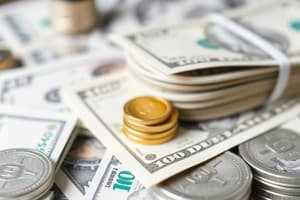Podcast
Questions and Answers
What is an economic system?
What is an economic system?
The structure of methods and principles a society uses to produce and distribute goods and services.
What is factor payment?
What is factor payment?
The income people receive in return for supplying factors of production - land, labor, or capital.
What is profit?
What is profit?
The amount of money a business receives in excess of its expenses.
What is a safety net?
What is a safety net?
What is the standard of living?
What is the standard of living?
What is innovation?
What is innovation?
What is a traditional economy?
What is a traditional economy?
The three key economic questions are: ______
The three key economic questions are: ______
What is a market?
What is a market?
What is specialization?
What is specialization?
What characterizes a free market economy?
What characterizes a free market economy?
What is a household?
What is a household?
What is a firm?
What is a firm?
What is a factor market?
What is a factor market?
What is a product market?
What is a product market?
What is self-interest?
What is self-interest?
What is an incentive?
What is an incentive?
What is competition in economics?
What is competition in economics?
What is the invisible hand?
What is the invisible hand?
What is consumer sovereignty?
What is consumer sovereignty?
What is a centrally planned economy?
What is a centrally planned economy?
What is a command economy?
What is a command economy?
What is socialism?
What is socialism?
What is communism?
What is communism?
What does authoritarian refer to in an economic context?
What does authoritarian refer to in an economic context?
What is laissez-faire?
What is laissez-faire?
What is private property?
What is private property?
What is a mixed economy?
What is a mixed economy?
What is economic transition?
What is economic transition?
What is privatization?
What is privatization?
What is a free enterprise system?
What is a free enterprise system?
Flashcards are hidden until you start studying
Study Notes
Economic Systems
- Economic System: The structure of methods and principles a society employs to produce and share goods and services.
- Factor Payment: Income earned by individuals in return for contributions of land, labor, or capital.
- Profit: Revenue exceeding the expenses of a business.
- Safety Net: Programs designed to protect individuals facing economic hardships like layoffs or disasters.
- Standard of Living: A measure of the economic prosperity, encompassing wealth and luxury.
Economic Concepts
- Innovation: The introduction of new methods, products, or ideas to the market.
- Traditional Economy: Economic model driven by habit, customs, or rituals that dictate production and consumption.
- Key Economic Questions: What should be produced? How should it be produced? Who will consume it?
Market Dynamics
- Market: Any system through which buyers and sellers can engage in the exchange of goods and services.
- Specialization: Focus of productive efforts on a limited range of activities to enhance efficiency.
- Free Market Economy: Economic decisions are guided by voluntary exchanges in markets.
Economic Entities
- Household: A person or group living together as a single economic unit.
- Firm: An organization that transforms resources into goods or services for sale.
Market Types
- Factor Market: Venue where firms acquire factors of production from households.
- Product Market: Platform where households purchase goods and services produced by firms.
Motivation and Influence
- Self-Interest: An individual's pursuit of personal gain in economic activities.
- Incentive: Motivators such as rewards or penalties that influence behavior.
- Competition: The rivalry among producers to attract consumer spending.
Economic Theories and Models
- Invisible Hand: Adam Smith’s concept that describes how individual self-interest indirectly benefits society.
- Consumer Sovereignty: Consumer power to influence production decisions through their purchasing choices.
- Centrally Planned Economy: Economic system where government, not individuals, dictates production and distribution.
Economic Systems: Socialism vs. Communism
- Command Economy: A system opposing free-market principles, with centralized decision-making.
- Socialism: Economic and political framework advocating for wealth distribution across society.
- Communism: A system where the government fully owns and controls resources and economic decisions.
Government and Economics
- Authoritarianism: Governments that restrict individual freedoms and demand strict compliance.
- Laissez-Faire: Economic philosophy favoring minimal governmental intervention in the marketplace.
Property and Economic Structures
- Private Property: Ownership of assets by individuals or corporations, not the government.
- Mixed Economy: An economic framework combining free market principles with some government intervention.
- Economic Transition: The shift from one economic system to another, often involving significant change.
- Privatization: Selling government-owned enterprises to private investors to encourage competition.
Enterprise and Ownership
- Free Enterprise System: An economy characterized by personal or corporate ownership of capital goods, emphasizing market freedom.
Studying That Suits You
Use AI to generate personalized quizzes and flashcards to suit your learning preferences.




